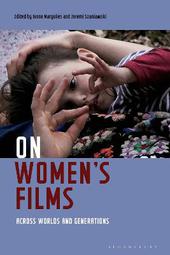
|
On Women's Films: Across Worlds and Generations
Paperback / softback
Main Details
| Title |
On Women's Films: Across Worlds and Generations
|
| Authors and Contributors |
Edited by Ivone Margulies
|
|
Edited by Professor Jeremi Szaniawski
|
| Physical Properties |
| Format:Paperback / softback | | Pages:408 | | Dimensions(mm): Height 229,Width 152 |
|
| Category/Genre | Film theory and criticism |
|---|
| ISBN/Barcode |
9781501332456
|
| Classifications | Dewey:791.43082 |
|---|
| Audience | | Tertiary Education (US: College) | |
|---|
| Illustrations |
75 bw illus
|
|
Publishing Details |
| Publisher |
Bloomsbury Publishing Plc
|
| Imprint |
Bloomsbury Academic USA
|
| Publication Date |
25 July 2019 |
| Publication Country |
United States
|
Description
On Women's Films looks at contemporary and classic films from emerging and established makers such as Maria Augusta Ramos, Xiaolu Guo, Valerie Massadian, Lynne Ramsay, Lucrecia Martel, Rakhshan Bani-Etemad, Chantal Akerman, or Claire Denis. The collection is also tuned to the continued provocation of feminist cinema landmarks such as Chick Strand's Soft Fiction; Barbara Loden's Wanda; Valie Export's Invisible Adversaries, Cecilia Mangini's Essere donne. Attentive to minor moments, to the pauses and the charge and forms bodies adopt through cinema, the contributors suggest the capacity of women's films to embrace, shape and question the world.
Author Biography
Ivone Margulies is Professor in the Film and Media Studies Department at Hunter College, CUNY, USA. She is the author of In Person: Reenactment in Postwar and Contemporary Cinema (2018), Nothing Happens: Chantal Akerman's Hyperrealist Everyday (1996), and is the editor of Rites of Realism: Essays on Corporeal Cinema (2003). Jeremi Szaniawski is the co-editor of Directory of World Cinema: Belgium (2014) and The Global Auteur: The Politics of Authorship in 21st Century Cinema (2016) and the author of The Cinema of Alexander Sokurov: Figures of Paradox (2014).
ReviewsThis collection, which addresses an academic and specialized audience within a transdisciplinary framework of interests in women and gender studies, film and media studies, and cultural theory, will be a precious tool in curricular courses on women and film, gender embodiment, and queer representation in film. It is also an engaging, highly readable book that broadens the definition of women's film through a wide selection of case studies and approaches. * H-France * This collection makes an urgent call for including women's cinema as an essential part of film history and practice. Summing Up: Highly recommended. Graduate students, researchers, faculty, professionals. * CHOICE * This cutting-edge book responds to the extreme diversity of women's filmmaking in the last decades. Its dazzling essays, with their focus on experimental and politically committed films, on agency and subjection, on shame and love, make compulsive reading. * Emma Wilson, Professor of French, University of Cambridge, UK * Unapologetically focused on women auteurs, this highly engaging collection of essays contextualizes their work historically and provides lucid, theoretically informed readings of their often provocative films. The editors have boldly applied a feminist corrective that stretches the canons of film history and our understanding of slow cinema. These essays reveal that the tropes of contemplative cinema such as self-inscription, duration, and micro description have deep roots in the history of women's films around the world and across the generations. * Robin Blaetz, Emily Dickinson Chair in Film Studies, Mount Holyoke College, USA * On Women's Films is a lively and varied collection of essays by senior scholars in the field and emerging talents, demonstrating the continued importance of women's cinema as a strategic formation for women's self-expression. The essays in this volume are energized by engagement between generations of feminists and by the book's broad historical and international perspectives. New scholarship on canonical figures brings their work into contact with contemporary feminist thought, and new figures are added to the tradition of women's cinema. A model of the art of updating without forgoing the gains of the past, this book is essential reading for anyone interested in women's filmmaking. * Alison Butler, Associate Professor in Film, University of Reading, UK *
|